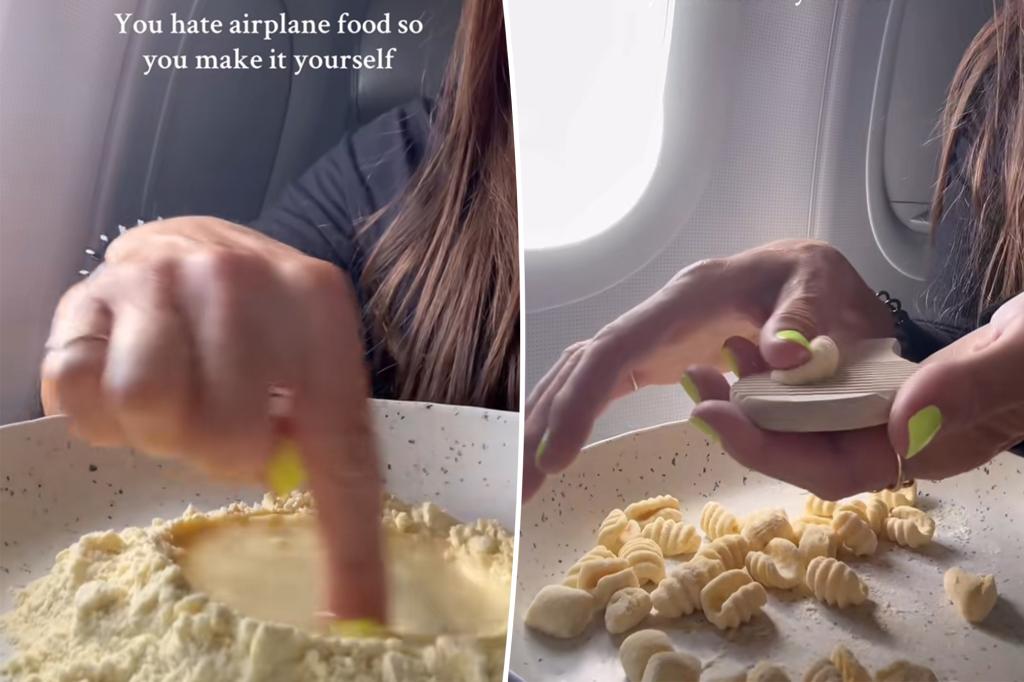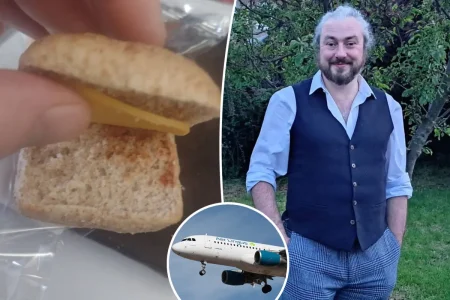From Frustration to Flavorful: How One Pasta Enthusiast Transformed Air Travel Dining
In a world where airline food has become synonymous with mediocrity, one passionate pasta enthusiast named Katie has taken in-flight dining into her own hands—quite literally. Katie, who has built a following as a pasta influencer, recently captured the internet’s attention when she decided to handcraft gnocchi from her window seat at 30,000 feet. Her viral TikTok video, which has amassed over 5 million views, shows her methodically mixing, rolling, and shaping the little potato dumplings on her tray table during a flight. “You hate airplane food, so you make it yourself,” she explained in the caption, showcasing her innovative approach to the common traveler’s dilemma of unsatisfying meals. The footage captures her obvious joy in the process, seemingly unbothered by the confined space or the curious glances of fellow passengers as she transforms basic ingredients into artisanal pasta while soaring through the clouds.
However, Katie’s culinary creativity has sparked significant controversy among viewers, many of whom have expressed concerns about hygiene and consideration for other passengers. The comment section quickly filled with warnings about the notorious uncleanliness of aircraft cabins. “As someone who cleaned airplanes, the street floor in Los Angeles is cleaner than ANYTHING you touch on that PLANE,” cautioned one commenter, while others pointed out the potential risks of preparing food in an environment where surfaces are known to harbor germs. Flight attendants have long advised passengers about the unsanitary conditions aboard aircraft, from the recycled air to the various contaminants that can be found on tray tables, seats, and other shared surfaces. Some viewers with health concerns, such as one person with celiac disease, noted that being seated next to someone handling flour and other ingredients could trigger serious allergic reactions, highlighting the broader implications of such activities in shared spaces.
Katie’s airborne pasta-making adventure joins a growing trend of travelers who have taken extreme measures to avoid airline food, though some have pushed boundaries even further. Other content creators have gone to more questionable lengths, such as one who prepared garlic shrimp in an airplane bathroom—a space universally acknowledged as one of the least hygienic areas on an aircraft. Similar social media stunts have featured passengers preparing notoriously pungent foods like tuna salads and boiled eggs during flights, creating unpleasant experiences for those seated nearby who have no choice but to endure the resulting aromas. These incidents raise important questions about the limits of personal freedom in shared spaces, especially in the confined environment of an airplane where escape options are nonexistent and air circulation is limited. The criticism directed at Katie reflects a broader societal conversation about consideration for others in public settings, summarized aptly by one commenter who pleaded, “Normalize remembering you’re in public again.”
Beyond the hygiene concerns, practical questions about Katie’s culinary project have emerged. Many viewers pointed out the obvious limitation of her efforts: “So now you have uncooked pasta. What now??” Indeed, without access to boiling water or cooking facilities, the purpose of preparing fresh gnocchi on a plane seems primarily performative rather than practical. This observation has led some critics to suggest that the entire exercise was more about creating engaging content than solving a genuine dining problem. In an era where social media influence drives behavior, the line between authentic problem-solving and attention-seeking stunts often blurs. Katie’s video exists in this gray area, simultaneously showcasing impressive culinary skill and raising eyebrows about the appropriateness of the setting she chose for her demonstration.
The passionate responses to Katie’s in-flight pasta preparation reflect deeper cultural attitudes about food, public spaces, and social boundaries. For some viewers, her actions represent a creative solution to a common travel frustration and an admirable dedication to quality food no matter the circumstances. These supporters see her efforts as a harmless expression of passion that harmed no one. Others, however, view the same behavior as self-centered and inconsiderate, prioritizing personal desires over community wellbeing in a shared environment. This divide mirrors broader societal tensions about individual freedom versus collective responsibility, playing out in the microcosm of an airplane cabin. The intense reactions also highlight how deeply personal food choices can be, and how strongly people feel about maintaining certain standards around food preparation, especially in public settings.
As air travel continues to evolve post-pandemic, passengers are increasingly seeking ways to personalize their experiences and overcome the limitations of standard airline offerings. Katie’s viral moment represents just one creative—if controversial—approach to this challenge. While airlines have made efforts to improve their culinary options in recent years, particularly in premium cabins, many travelers still find themselves disappointed by the quality, variety, or availability of in-flight meals. This dissatisfaction has spawned numerous travel hacks, from passengers bringing elaborate pre-prepared meals aboard to creating custom snack boxes for long-haul flights. What differentiates Katie’s approach is not just the act of bringing her own food but the entire process of creating it from scratch in a public setting. As the debate around her pasta-making continues, it serves as a reminder of the complex social contract we all navigate when we enter shared spaces—and how even something as seemingly innocent as making pasta can become a lightning rod for discussions about courtesy, hygiene, and the boundaries of acceptable public behavior in our increasingly connected and documented world.















